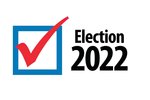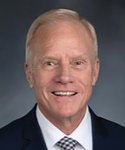




The newly-redrawn Washington State 17th Legislative District will see at least one new face representing its constituents next year, as an incumbent seeks a seventh term and two newcomers seek to replace an outgoing seatholder.
During an Oct. 3 candidate forum hosted by the League of Women Voters of Clark County, four candidates for the district’s two seats in the state House of Representatives faced off. After last year’s redistricting process, the 17th district shifted from being more centrally focused in Clark County to cover the east part of the county and all of Skamania County.
17th Legislative District Position 1
After redistricting, incumbent Republican Vicki Kraft was drawn out of the district and instead ran unsuccessfully for Washington’s Third Congressional District.
Eyeing to replace Kraft are Democrat Terri Niles, a 25-year critical care nurse, and Republican Kevin Waters, the executive director of the Skamania Economic Development Council.
With 2023 being a budget year in the Legislature, the candidates gave their priorities for funding, especially regarding projected surpluses.
Waters, who once served as a corrections officer, said funding for law enforcement is a top priority. While counties and cities fund their police and sheriff’s departments at the local level, “at some point I feel that the state should get involved,” Waters said. He said pay discrepancies between departments can affect retention.
He wants to see a “baseline” in the infrastructure funding for schools in the state.
Niles said any surplus state funds should be used in the community as a “cushion” to keep public services steady given the inflationary environment. Her funding priorities include affordable housing, child care and infrastructure like expanded broadband.
“Anyone that says that broadband sounds like a nice idea for all but it’s not attainable, I 100% disagree,” Niles said.
Regarding the project to replace the Interstate 5 bridge over the Columbia River, Waters said he would like to see additional capacity and a lower bridge height than what was proposed.
Waters didn’t express concerns about the proposed design of the bridge, but he said “we need the Oregon side to start playing ball with us.”
“For me I just want to see a bridge that works. I want to see the best bridge for Southwest Washington,” Waters said.
Niles stressed the importance of light rail as the mass transit option over the bridge replacement. While working in Oregon, she said the medical staff who traveled to work during snowstorms took Portland’s transit.
“I think that people don’t realize how important light rail is and how it’s important for providing essential services,” Niles said.
On voting procedures in the state, Waters said the current system for Washington works and noted any changes could end up as a detriment.
“I’m pretty happy with Washington voter laws,” Waters said.
Niles appreciated Waters’ stance on the state of voting in Washington, noting others in the Republican party have taken aim at the election process with claims of fraud.
On land use, Niles said current state policy helps protect a loss of identity other parts of the country face. She pointed to places like Phoenix, Arizona which she said does not have the types of guidance that Washington state has through its Growth Management Act.
“There’s no urban character, there’s no rural character, and so that’s a good example of urban sprawl,” Niles said.
Waters said he is a proponent of “expanding” the uses in the Growth Management Act. He said he has seen issues in Skamania County where land fit for residential development is prohibited from that use due to planning.
On state abortion rights, Waters acknowledged his Catholic faith leads him to be against the procedure personally.
“I also honor the vote of the people and … the people have said through initiative that they want to have abortion rights for women,” he said.
Niles said that was a reversal from previous statements Waters made regarding abortion bans.
“I will work every day … to protect privacy and reproductive health care freedoms, and to keep government out of decisions that should be yours, and yours alone,” Niles said.
Last year, the redistricting of state legislative and Congressional boundaries ended up in the state supreme court’s hands after the bipartisan commission tasked with redrawing the borders blew a deadline by minutes.
Niles said there was a “genuine lack of transparency that happened on both sides of the aisle.” Waters said he favored the state’s redistricting process, saying he wouldn’t make any changes to it.
17th Legislative District Position 2
For the 17th Legislative District Position 2 seat, Republican Paul Harris seeks to retain a seventh term in Olympia. He faces Democrat Joe Kear, who has been a union representative for machinists and aerospace workers and also has been involved in social issues ranging from school desegregation to women’s and LGBT rights.
On the state’s climate policy, Kear said the state’s effort to move away from fossil fuels is an opportunity for job growth through the conversion process. He said the state should support efforts that benefit the entire populace “and not just those who can afford to do things on their own.”
Harris said he wants the Legislature to proceed with climate change issues “very carefully.” He said state lawmakers passed “very stringent laws” in the past session, the impacts of which will not be seen until next year. He said those laws put the most pressure on those who can’t afford tax increases or other impacts related to the legislation.
“I think we need to really look at what the endgame is. … Are we really getting a much better environment?” Harris asked.
Kear said he was involved with the abortion rights movement before the Roe V. Wade supreme court case. He said although Washington state is good at protecting the right to abortion, it should be constitutionally codified.
Harris said he heard from legislative Democrats the codifying of the right would be brought up during next year’s session.
“I actually believe we need safe, legal and limited abortions in our state, absolutely. I will do nothing to overturn that,” Harris said.
Harris said the Growth Management Act “protects the environment extremely well” but there is a lot of need to expand uses to allow for more affordable housing.
“If we want to address affordable housing, the more limited real estate we have to build housing on, the more difficult and the more expensive housing will become,” Harris said.
He stressed any opening up of the act needs to be done carefully to maintain the environmental protection it provides.
Kear said land use law changes need to be “very stringent” on protecting agriculture and resource land.
“It’s a conflict because Clark County has a lot of good, flat land that builders want. It’s good for agriculture and industry would like (it) as well,” Kear said.
He said any changes need to be made through a cooperative process with the public.
With the state’s regular surpluses, Kear said the state has an obligation to put it “to work for the people.” He said the money can be funneled into housing, child care, health care and higher education efforts, as well as for community policing to support minority communities.
“Everyone should be feeling safe,” Kear said.
Outside of more funding for mental health issues, Harris said he would be interested in offering tax relief to citizens.
“We have inflation that is rampant,” Harris said. “If our revenues continue and continue and continue to increase, we need to offer some back to our constituents and try to help them.”
Both Harris and Kear agreed the I-5 bridge’s replacement is necessary. Kear said he supports light rail as the mass transit option, adding additional crossings over the river need to be looked at following the work on the interstate.
“This is the one we have to work on now, but our metropolitan area has two crossings. If you look at St. Louis, there are eight crossings across the Mississippi River,” Kear said.
Kear said he would support changing the threshold for school district construction bonds from requiring a more than 60% supermajority to requiring a simple majority. He also advocated for more state support for rural districts who can’t shoulder the cost of bonds.
Harris said he supports an effort for a bill that requires only more than 55% approval that did not end up passing as a compromise. At that rate, he said up to 90% of construction bonds would pass. He said some existing programs could be augmented to help pay for school construction.
Harris said he is pleased with Washington’s current voting system and its integrity. He said he enjoys the privacy of the mail-in process and has no doubt his vote will be counted.
“I’m not a conspiracy theorist that believes any election has been stolen, ever,” Harris said. “I believe that anybody that’s lost, actually lost, and anybody that won, they won.”
Kear said he would like to expand voter access, saying Harris voted against expanding the time period for registrations.
“I think that it’s our obligation to let everyone vote and make sure that everyone has the opportunity to vote,” Kear said. “This is what democracy and America is built on.”
The four candidates will join dozens of others seeking to be elected in this year’s general election. The deadline to submit ballots is 8 p.m. on Tuesday, Nov. 8.